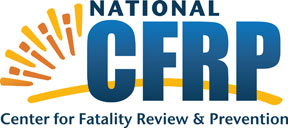Highlighting Our Partners: National Center for Fatality Review and Prevention

What is the National Center and what is its mission?
The National Center for Fatality Review and Prevention (National Center) is the technical support and data center serving Child Death Review (CDR) and Fetal and Infant Mortality Review (FIMR) programs throughout the United States. CDR and FIMR have a similar overarching purpose:
- Conduct multidisciplinary reviews of deaths that lead to a better understanding of how and why deaths occur, and
- Use findings to catalyze systems-level change to prevent future deaths, ultimately improving the health and safety of communities, families, child-bearing people, infants, and children.
The death of a single child is a profound loss to a family and community. When a community experiences the death of a child, it wants answers, a deep understanding of what happened, and opportunity to make change. The mission of the National Center is to help communities reach this understanding and prevent future deaths by offering a wide variety of services to CDR and FIMR programs, including supporting the implementation of prevention-focused reviews, developing and maintaining a national database (NFR-CRS), training review teams and the broader field, and consulting on strategic planning and program development.
What would you like our readers to know about your work?
A key tenet of our work is for fatality reviews to be focused on prevention. Rather than conducting reviews that place blame on individual agencies or people, we strive to keep teams centered on what can be done differently and better in the future to protect children and keep them safe and healthy. Part of this focus challenges fatality review teams to consider systems-level factors and upstream prevention. Fatality review methodologies offer unique strategies to identify community and systems factors that significantly affect health disparities. Because of this, a core part of our work is encouraging teams to incorporate equitable practices across the fatality review process.
How has working with the Injury Center helped you achieve this mission?
Over the years, our partnership with the Injury Center has been incredibly meaningful. In 2021, the Injury Center helped us conduct a widescale assessment of CDR programs across the country. This assessment helped to understand the current structure of CDR programs and their successes, challenges, and needs. Results of the assessment highlighted areas for the National Center to improve our services and remove barriers to an effective fatality review process. For example, a common theme of the assessment was the tremendous data entry burden of completing the National Fatality Review-Case Reporting System (NFR-CRS). In the years since the assessment, we have made tremendous improvements to the NFR-CRS to both ease the task of data entry and enhance data quality. We also continue to intentionally explore options for data modernization that will further reduce data entry burden.
As mentioned above, a big part of our mission centers on helping communities use their data to drive change. In the last couple years, the Injury Center has collaborated with the National Center on developing “translation guides.” The guides aim to help fatality review teams make sense of their data and identify potential evidence-based/informed prevention practices. We look forward to eventually offering these helpful tools to the field.
What can other similar organizations learn from your organization?
Building authentic relationships with the people you serve is essential. If we have learned anything over the years, it is that our work is incredibly relational, and we LOVE it. Ask any National Center staff person, and they will echo that the best part of the job is connecting with the folks we serve, especially in person. The work of fatality review is hard, but building relationships and connections is invaluable for everyone to feel like they have hands on their back supporting and pushing them through the tough spots.
Tell us a fun fact about your organization.
The physical locations of our National Center team span all mainland US time zones. We have folks in Pacific Time (Washington), Mountain Time (Arizona, Colorado), Central Time (Wisconsin), and Eastern Time (Michigan). Luckily for us this means that we can accommodate a wider range of meeting times to meet our partner’s needs. And who knows?! As our staff continues to grow, maybe we’ll have coverage in the Alaskan and Hawaiian time zones soon!
